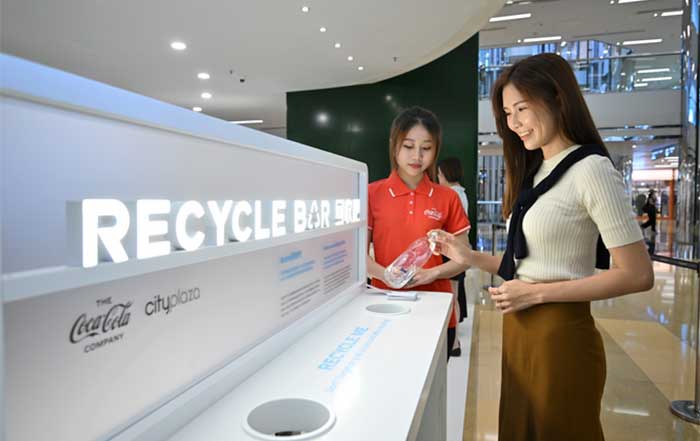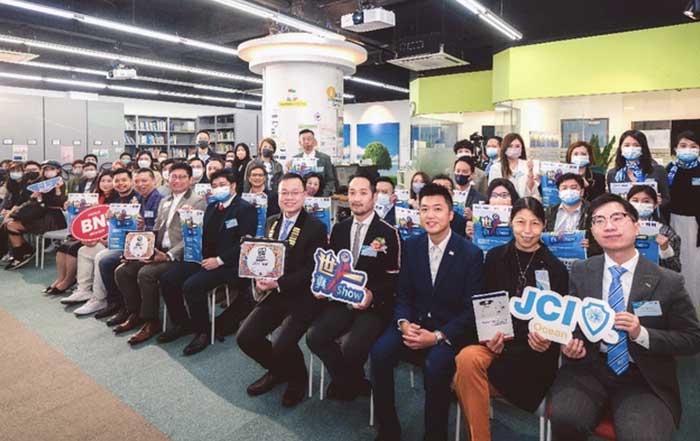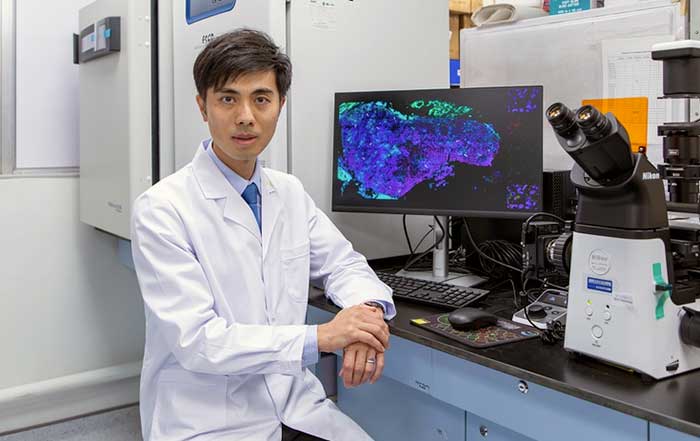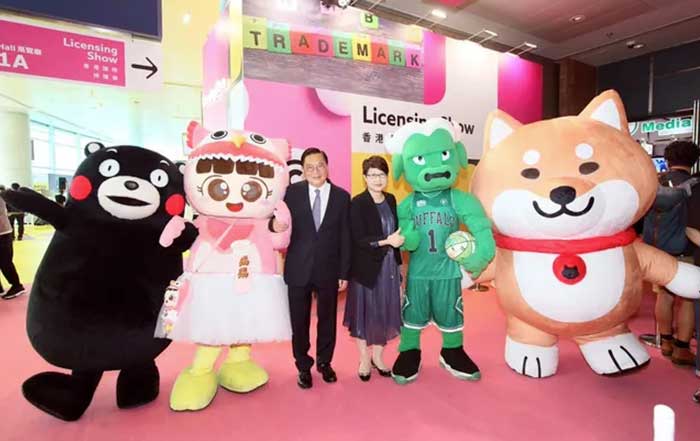To demonstrate that recycled PET bottles can be given a new life – again and again – thus helping to foster recycling habits of the public, The Coca-Cola Company in Hong Kong joins hands with the City Plaza in launching Hong Kong's first ever 'Recycle Bar', in response to World Environment Day on June 5.
"Recycle Bar" opens on June 2 and runs through June 11. Decorated with more than 30 pieces of bar furniture made out of 18,000 plastic bottles by 3D-printing, and with a collection of rPET turned everyday items that is exhibited on spot, the 'Recycle Bar' aims to raise public awareness about proper collection and recycling of used resources (e.g., plastic bottles) to minimize carbon footprint. Visitors are encouraged to recycle used PET bottles for redemption of free beverages and rPET-made souvenirs.
Giving rPET a second life – furniture and everyday items made out of rPET
When recycled properly, PET is a useful material that can be reused again and again. To showcase its endless possibilities, The Coca-Cola Company in Hong Kong has transformed 18,000 recycled PET bottles into bar furniture like bar counter, bar stools, tables and chairs, which are all locally produced. After the exhibition, the furniture will be reused at an 'Recycling Academy' experience center, which is also part of The Coca-Cola Company's public education efforts.
Apart from rPET furniture, rPET can also be "reborn" into everyday accessories that we need in our daily life. A collection of rPET accessories from the U.S., Chinese mainland and the Hong Kong market are also exhibited in the "Recycle Bar", showing consumers what can be achieved if the community starts to recycle PET bottles together.
From bottle to bottle – the secret behind PET recycling process
"Recycle Bar" is also an educational exhibition for recycling as it unveils the procedures of PET recycling inside a recycling facility, showing consumers how a used bottle can become a brand-new beverage container for new drinks in a plastic recycling 'loop'. Consumers are also invited to experience one of the recycling procedures by shredding PET bottles in the 'Recycle Bar'. Consumers may also learn more about proper recycling of beverage packaging.
"In addressing environmental issues, we believe everyone should be accounted for and be accountable. Through public displays like Recycle Bar, as well as other roadshows and workshops that provide consumers with knowledge and experience in PET bottle recycling, we invite Hong Kong people to get inspired through seeing how used PET bottles can be given a new life - again and again - if returned and recycled properly. We encourage our consumers to become aware of their recycling habits - and to change them if necessary - thus partnering with us in helping to build a World Without Waste," said Marella Canepa Risso, Franchise Operations Director, Hong Kong and Macau, The Coca-Cola Company.
Marella continued: "This effort echoes Bonaqua®'s long-time commitment to sustainable solutions and inspiring more consumers to adopt sustainable lifestyle. The locally produced Bonaqua® Mineralized Water (2L or below) already uses 100% rPET for production, with its bottle 52.8% lighter than conventional PET bottles. We also launched label-less bottles in the Hong Kong and Taiwan markets over the past couple of years in order to further reduce the use of plastics and increase the bottles' recyclability."
"At Swire Properties, sustainable development (SD) is central to our business philosophy and company culture. With our SD2030 Strategy, we have been taking actions to contribute to resources management and circularity. Materials recycling facilities have been set up in our developments to foster a healthy recycling ecosystem. We are happy to support Coca-Cola in launching the Recycle Bar with an aim to foster a healthy recycling culture in Hong Kong. In order to establish a city-wide recycling culture in Hong Kong, it is important for us to enhance public education as well as build up a recycle-friendly city with user-friendly facilities," stated Aileen Chan, General Manager from Cityplaza.
Recycle to redeem free beverage and rPET souvenirs
"Recycle Bar" invites consumers to return plastic bottles with which the organizers can later produce many everyday items. To encourage consumers to establish the habit of recycling, consumers can collect points upon recycling PET bottles, and redeem different kinds of beverages such as Bonaqua® Mineralized Water, which uses 100% rPET for the production of its bottles, as well as other Coca-Cola rPET souvenirs like jacket, polo shirt and pencil cases.
Weekend DIY planting workshops with rPET
Consumers are invited to participate in the DIY planting workshops with rPET over the weekends for free! Each participant can receive a limited edition rPET flowerpot, which is made out of 2 recycled PET bottles. They may have a guided private tour at the Recycle Bar, in which they will enjoy a planting lesson with a succulent plant, as well as turning their own rPET flowerpot into a unique art piece. The tutor will also share knowledge about rPET as well as proper recycling.
About The Coca-Cola Company
The Coca-Cola Company is a total beverage company, offering over 500 brands in more than 200 countries. In Hong Kong, the company has a portfolio covering sparkling, sweetened and unsweetened tea, juice, sports drink, water, enhanced hydration beverages, etc. We have 15 brands offering 70 different variants such as "Coca-Cola", "Coca-Cola No Sugar", "Coke Plus", "Sprite", "Fanta", "Schweppes", "OOHA", "Bonaqua" Mineralized Water, "Authentic Tea House", "Minute Maid", "Minute Maid Qoo", "Glaceau vitaminwater", "Yeung Gwong", "Aquarius", "Healthworks", and "Kochakaden" CRAFTEA". We are constantly transforming our portfolio, from reducing sugar in our drinks to bringing innovative new products to market.




